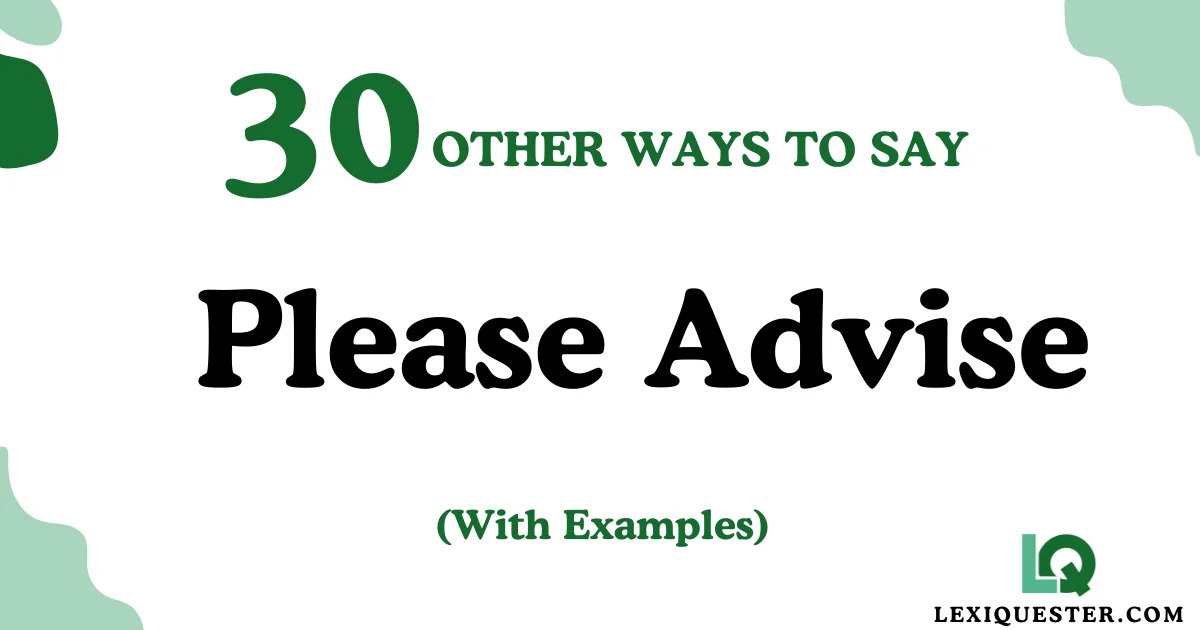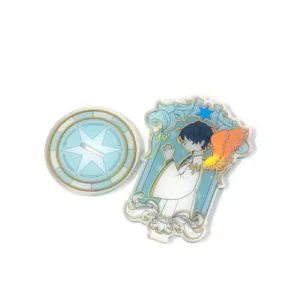In professional and personal communication, finding the right words to request guidance or information can make your message sound more thoughtful and considerate. The phrase “please advise” is commonly used to request input, yet it can sometimes feel impersonal or abrupt.
Here are 30 alternatives to “please advise” that add warmth, clarity, and a touch of empathy, making your requests more inviting and personable.
What Does “Please Advise” Mean?
“Please advise” is a phrase typically used to request direction, guidance, or clarification on a topic. It’s often used in emails or formal messages to encourage a response or ask for assistance with decision-making.
When to Use “Please Advise”
“Please advise” is best used when you need guidance, confirmation, or next steps from someone with expertise or authority.
However, depending on the relationship or context, alternative phrases may help convey your request more warmly and specifically, making the response process smoother.
Is It Professional/Polite to Say “Please Advise”?
Yes, “please advise” is generally professional and widely accepted, though it can sometimes feel formal or abrupt. Alternatives that are more conversational or tailored to the situation can help you achieve the same goal with added clarity and warmth.
Please Advise Synonym:
- Could You Let Me Know?
- I’d Appreciate Your Input
- Your Guidance Would Be Helpful
- Could You Provide Some Insight?
- Would You Be Able to Clarify?
- I Value Your Opinion on This
- Could You Advise on the Best Course of Action?
- Any Suggestions You Could Offer?
- May I Have Your Recommendations?
- Your Thoughts Would Be Appreciated
- Could You Offer Some Guidance?
- I’d Love Your Perspective
- Could You Shed Some Light on This?
- Would You Mind Sharing Your Expertise?
- I’d Be Grateful for Your Advice
- Can You Help Me Understand?
- If You Have Any Tips, Please Share
- What Would You Suggest?
- Would You Mind Giving Me Some Direction?
- Do You Have Any Advice on This?
- I Could Use Your Advice Here
- Any Thoughts on This Matter?
- Could You Provide Some Direction?
- Your Advice Would Be Most Welcome
- What Do You Recommend?
- Could You Kindly Offer Your Opinion?
- I’d Appreciate Your Thoughts
- If Possible, Could You Share Some Guidance?
- Could You Help Point Me in the Right Direction?
- May I Ask for Your Expertise?
1. Could You Let Me Know?
Meaning: Asking for information or guidance
Explanation: A polite and friendly way to request input.
Example: “Could you let me know the next steps for this project?”
Tone: Friendly and straightforward
2. I’d Appreciate Your Input
Meaning: Requesting feedback or thoughts
Explanation: This phrase acknowledges the recipient’s expertise and expresses gratitude in advance.
Example: “I’d appreciate your input on how to proceed with this matter.”
Tone: Grateful and respectful
3. Your Guidance Would Be Helpful
Meaning: Seeking direction
Explanation: Emphasize that their advice is valuable to you.
Example: “Your guidance would be helpful as we finalize these plans.”
Tone: Polite and appreciative
4. Could You Provide Some Insight?
Meaning: Requesting perspective or understanding
Explanation: Suitable for when you’re seeking their expert opinion.
Example: “Could you provide some insight into the best approach here?”
Tone: Curious and professional
5. Would You Be Able to Clarify?
Meaning: Asking for clarity
Explanation: Useful when there’s ambiguity in the information provided.
Example: “Would you be able to clarify the requirements for this project?”
Tone: Respectful and clear
6. I Value Your Opinion on This
Meaning: Requesting thoughts with respect
Explanation: Shows genuine appreciation for their viewpoint.
Example: “I value your opinion on how to handle this situation.”
Tone: Warm and appreciative
7. Could You Advise on the Best Course of Action?
Meaning: Asking for suggested steps
Explanation: Adds specificity and respect to your request.
Example: “Could you advise on the best course of action here?”
Tone: Formal and clear
8. Any Suggestions You Could Offer?
Meaning: Asking for ideas or recommendations
Explanation: Ideal for inviting the recipient’s thoughts.
Example: “Any suggestions you could offer would be greatly appreciated.”
Tone: Open and polite
9. May I Have Your Recommendations?
Meaning: Seeking specific advice
Explanation: A formal way to ask for advice with an open-ended approach.
Example: “May I have your recommendations for moving forward?”
Tone: Formal and professional
10. Your Thoughts Would Be Appreciated
Meaning: Inviting their input
Explanation: Makes the request feel gentle and courteous.
Example: “Your thoughts would be appreciated on this proposal.”
Tone: Respectful
11. Could You Offer Some Guidance?
Meaning: Seeking help
Explanation: Polite and to the point, often used when you need direction.
Example: “Could you offer some guidance on how to approach this?”
Tone: Respectful
12. I’d Love Your Perspective
Meaning: Inviting a different viewpoint
Explanation: This phrase adds warmth and shows respect for their insight.
Example: “I’d love your perspective on how to handle this challenge.”
Tone: Friendly and inviting
13. Could You Shed Some Light on This?
Meaning: Requesting clarity or insight
Explanation: Works well for asking for a deeper understanding.
Example: “Could you shed some light on the expected timeline for this project?”
Tone: Polite and conversational
14. Would You Mind Sharing Your Expertise?
Meaning: Inviting guidance based on knowledge
Explanation: Acknowledges their experience and expertise.
Example: “Would you mind sharing your expertise on the best way to approach this?”
Tone: Respectful
15. I’d Be Grateful for Your Advice
Meaning: Requesting guidance with appreciation
Explanation: A formal phrase expressing gratitude in advance.
Example: “I’d be grateful for your advice on how to proceed with this issue.”
Tone: Grateful and sincere
16. Can You Help Me Understand?
Meaning: Asking for clarification
Explanation: A warm phrase that invites a clearer explanation.
Example: “Can you help me understand the requirements for this task?”
Tone: Friendly
17. If You Have Any Tips, Please Share
Meaning: Requesting helpful hints or suggestions
Explanation: A casual way to ask for small pieces of advice.
Example: “If you have any tips, please share them with me.”
Tone: Warm and informal
18. What Would You Suggest?
Meaning: Asking for specific advice
Explanation: This direct phrase invites the recipient’s personal opinion.
Example: “What would you suggest we focus on first?”
Tone: Open and conversational
19. Would You Mind Giving Me Some Direction?
Meaning: Asking for help with the next steps
Explanation: Ideal for seeking actionable guidance.
Example: “Would you mind giving me some direction on how to proceed?”
Tone: Polite
20. Do You Have Any Advice on This?
Meaning: Seeking specific input
Explanation: A flexible phrase that works in many situations.
Example: “Do you have any advice on handling this type of issue?”
Tone: Curious and open
21. I Could Use Your Advice Here
Meaning: Requesting help or insight
Explanation: This phrase is casual but respectful, asking for help with a challenge.
Example: “I could use your advice here on the best approach to take.”
Tone: Friendly
22. Any Thoughts on This Matter?
Meaning: Inviting feedback or ideas
Explanation: A simple way to open up the floor for feedback.
Example: “Any thoughts on this matter would be appreciated.”
Tone: Polite
23. Could You Provide Some Direction?
Meaning: Asking for guidance on next steps
Explanation: A formal phrase that suggests respect and professionalism.
Example: “Could you provide some direction on the project priorities?”
Tone: Formal
24. Your Advice Would Be Most Welcome
Meaning: Appreciating the value of advice
Explanation: Conveys gratitude and respect for their input.
Example: “Your advice would be most welcome as we prepare our next steps.”
Tone: Warm
25. What Do You Recommend?
Meaning: Asking for a specific suggestion
Explanation: Straightforward yet respectful, ideal for clear guidance.
Example: “What do you recommend we address first?”
Tone: Clear
26. Could You Kindly Offer Your Opinion?
Meaning: Asking for a viewpoint politely
Explanation: Adds warmth and kindness to a request for feedback.
Example: “Could you kindly offer your opinion on this draft?”
Tone: Polite
27. I’d Appreciate Your Thoughts
Meaning: Seeking general feedback
Explanation: Friendly and inviting, suitable for seeking open-ended feedback.
Example: “I’d appreciate your thoughts on the timeline we’ve set.”
Tone: Friendly
28. If Possible, Could You Share Some Guidance?
Meaning: Asking for assistance respectfully
Explanation: Adds a polite touch and indicates flexibility in the request.
Example: “If possible, could you share some guidance on the new policy?”
Tone: Respectful
29. Could You Help Point Me in the Right Direction?
Meaning: Seeking general guidance
Explanation: Adds a warm, friendly touch to a request for direction.
Example: “Could you help point me in the right direction regarding this decision?”
Tone: Friendly
30. May I Ask for Your Expertise?
Meaning: Requesting specialized advice
Explanation: Acknowledges and values the recipient’s knowledge.
Example: “May I ask for your expertise on the technical aspects?”
Tone: Respectful
Conclusion
While “please advise” is a functional and direct way to ask for guidance, these 30 alternatives allow you to convey thoughtfulness, warmth, and specificity in your communication.
By choosing words that acknowledge the recipient’s expertise and express your appreciation, you make your requests more inviting and likely to receive a positive, helpful response.
Recent Posts
- 30 Other Ways to Say “Please See Attached” in Email (With Examples)
- 30 Other Ways to Say “Jerk Off” (With Examples)
- 30 Other Ways to Say “Please Let Me Know Your Thoughts” (With Examples)
- 30 Other Ways to Say “You As Well” (With Examples)
- 30 Other Ways to Say “Sweet Dreams” (With Examples)

Harper Scott is a dedicated wordsmith and the creative mind behind LexiQuester, where language and curiosity converge. She specializes in crafting captivating content that sparks imagination and a love for learning.














